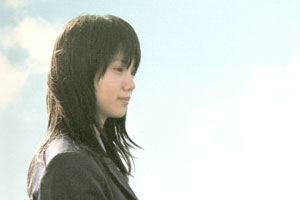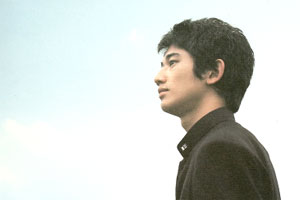|
|
|
|
|
|
|
|
Su-ki-da |
|
|
|
 
(left) Aoi Miyazaki and (right) Eita in Su-ki-da. |
|
|
Year: |
2005 |
|
|
|
Director: |
Hiroshi
Ishikawa |
|
|
| |
Cast: |
Aoi
Miyazaki, Eita, Hidetoshi Nishijima, Hiromi Nagasaku,
Ryo Kase, Maho Nonami, Nao Omori, Sayuri Oyamada |
|
| |
The
Skinny: |
A well-acted, if sometimes frustrating drama that eventually
pays off by story's end --if you're willing to put up
with the journey. |
|
|
Review by
Calvin
McMillin: |
Saying "I love you" has
never been so hard - or taken quite so long. At least,
that's the impression I take from director Hiroshi Ishikawa's
2005 project, Su-ki-da. It's an involving drama
that may test the viewer's patience, but its eventual
delivery of a simple, rewarding coda pretty much justifies
the opaque, minimalist, and sometimes tedious choices
that typify most of the film.
Su-ki-da's narrative
is divided right down the middle, separated by two eras.
In the first half, we are introduced to Yu (NANA's
Aoi Miyazaki), a seventeen-year old girl who has a crush
on her classmate Yosuke (Eita, from Summer Time Machine
Blues). As the narrative unfolds, we learn that
Yosuke was once a gifted baseball player, but for reasons
unexplained (and will also remain so), he has now decided
to embark on a career in music. He's picked up the guitar
and even composed the beginnings of a catchy song -
one that immediately grabs Yu's already rapt attention.
Although we are shown little
in the way of conversation between Yu and Yosuke, a
budding friendship seems to be in the works. Unfortunately,
Yosuke has inexplicably taken a fancy to Yu's older
sister (Sayuri Oyamada). It's a strange choice, as not
only is she in mourning over the death of her boyfriend,
but she also seems, at the very least, somewhat mentally
unbalanced as a result. Yu ends up encouraging her sister
to meet Yosuke, sacrificing her own happiness for that
of her grieving sister and the boy she so clearly loves.
This meeting lifts the spirits of Yu's sister, but just
when Yosuke seems ready to verbalize his feelings (whatever
they may be) to Yu, EVERYTHING GOES TO HELL. Twice.
Yeah, you knew it was coming.
Flash forward seventeen years,
and we find a grown-up Yosuke (Hidetoshi Nishijima),
who claims via voiceover to be making ends meet on the
fringes of the music industry. From that description,
one expects him to be working as a local musician living
from gig to gig, but the sad truth is he's actually
given up playing the guitar and now works as a sound
technician. Of course, the inevitable reunion with Yu
is just around the corner, but not without an unexpected
detour. Outside the studio, he stops a would-be thief
(Ryo Kase) from robbing a woman passed out on the street
(Maho Nonami). It's a noble gesture, but Yosuke's Good
Samaritan act will end up having unexpected consequences
later in the picture.
Naturally, one wonders whether
the woman Yosuke saves will turn out to be the down-and-out,
grown-up version of Yu, but (Spoiler alert!) she's not.
But that's not to say the woman doesn't serve a purpose.
Unable to get an address from her, Yosuke takes her
back to his apartment to let her sober up. When she
comes to her senses, the two end up having a conversation
that sparks some memories from Yosuke's past. And as
fate would have it, Yu (now played by Hiromi Nagasaku)
walks back into his life not too long after. The two
reunited friends are finally able to reconnect and Yosuke
takes stock of his life. He makes a few bold moves to
change his life for the better, but wouldn't you know
it? EVERYTHING GOES TO HELL again! Can't these
two potential lovebirds get a break? Well, if it's any
consolation, there's still ten more minutes to the story.
Although filled with beautiful
imagery and some strong acting performances (particularly
from the two Yu's: the heartbreakingly good Aoi Miyazaki
and Hiromi Nagasaku), Su-ki-da has an odd quality
to it. For me, I experienced a good measure of frustration
with the story, and yet, when all is said and done,
it's a film that has stayed with me. Ishikawa definitely
has some stylistic quirks that may not be to everyone's
liking. For one, there's minimal dialogue throughout
the film, which is only magnified by Ishikawa's preference
for holding shots a bit longer than one might expect,
not to mention his lingering, often repetitive shot-reverse
shot compositions. In other words, the actors don't
talk much and frequently end up staring either at each
other or at nothing at all for inordinate amount of
time. It's a tension-building technique that is perhaps
meant to pull you into the film, but it feels a bit
overused. Ishikawa also has a tendency to let characters
drift out of the frame, especially at times when their
expressions are crucial to reading exactly what's going
on in the given situation. Is it inventive camerawork
or an unnecessary distraction? For me, it bounced back
and forth between the two. Your reactions may vary.
Thematically, Su-ki-da
is all about missed opportunities and second chances.
It's well-traveled territory that's been explored in
everything from 2000's Crouching Tiger, Hidden Dragon
to the recent Korean drama, Lost in Love, but
notably, Ishikawa's film takes this message to a heart
wrenching extreme. To wit, the film boasts a bleak,
out of nowhere "ending" that most certainly
would've earned Su-ki-da the title of "Most
Depressing Movie Ever," if not for a last second
reprieve in which everything that comes before crystallizes
in a final, fitting conclusion. Although it's certainly
not everyone's cup of tea (at times, it tasted a little
sour to me, too), Su-ki-da ultimately proved
to be a rewarding, elegant film - and one I won't soon
forget. (Calvin McMillin, 2007) |
|
|
Availability: |
DVD (Japan)
Region 2 NTSC
16x9 Anamorphic Widescreen
Japanese Language Track
Dolby Digital 2.0
Removable English and French Subtitles
Various Extras |
|
|
|

|
|
|
|
|
|
|
|
|
|
|
|
|
|
|
|
| LoveHKFilm.com
Copyright ©2002-2017 Ross Chen
|
|
|